Serendip is an independent site partnering with faculty at multiple colleges and universities around the world. Happy exploring!
Notes Towards Day 16: Exploring Our Mirror Image

Class Notes by sgb90 and by aybala50
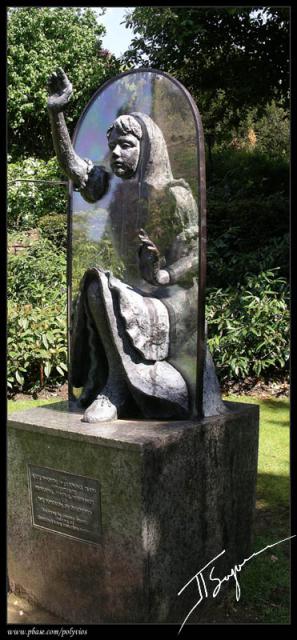 |
From "fluid" to "fixed" (shudder....)
I. coursekeeping
notetaking today: aybala50 & sgb90
(surprised to see no discussion, in mid-semester evals,
about note-taking: do you find it useful to do/have, or....?)
my great pleasure in reading the counter-accounts:
teal's "Anne ended the conversation by defining reality as something
we have agreed upon collectively through expectation and predictability,"
vs. racher's report that Wai Chee concluded our discussion by saying,
"It seems like right now that what is real is what is accepted by custom,
what is expected and predicted, something that has historical agreement."
who said what? how can we know for sure??
ALSO: "If we can’t define reality by scent or fallibility, then how?"
(If I meant to say "assent, but racherr heard "scent"...
what actually happened??)
one pay-off of your paired notes is to keep such questions open!
____
on Thursday, we'll continue to
pursue "mirror images" of Alice;
several of these "parody-parodies" have already
been scoped out by ShaynaS, jrf and spleenfiend:
Alice in Wonderland (1933 -- worth it for W.C. Fields as Humpty Dumpty!)
Disney's Alice in Wonderland (1951)
Jan Svankmajer's Neco z Alenky (1988 --
"possibly the most disturbing Alice movie we could have chosen")
Woody Allen's Alice (1990)
Tim Burton's Alice (2010)
Alice Sontag's Alice in Bed (1992)
American McGee's Alice (2000-"which features an older Alice,
who is committed to an insane asylum, running around with
a knife, and later ... a gun").
additional suggestions, from
racherlr: Donald in Mathmagicland
TPB1988 (w/ cheers from Molly and me): Phoebe in Wonderland --
"I am shocked at how effective it was in helping me understand the text."
jrf: Hatter M, a graphic-novel adaptation of the Alice
stories where the Hatter is a superpowered warrior
who has to venture into the real world to rescue Alice
spleenfiend: White Rabbit by Jefferson Airplane
have you thought of others?
as you do, please share 'em on the forum....
some copies to share....how to manage this??
fair warning that my questions on Thursday will be about what difference GENRE makes:
how the story of Alice has altered as it evolves from prose narrative to filmic (etc.) form;
in particular, how the portrayal of TIME changes when the genre-shift takes place
![]()
the discussion w/ Wai Chee, last Tuesday, in our faculty working group on Evolving Systems,
focused on the different ways time might be measured, the different ways it operates
in each of our disciplines (not to mention individual brains!); she said,
"to think of anything as 'literature' implies a sequence, a before-and-after" (i.e.: a sense of TIME....);
literature makes no sense in the absence of the measuring tape of time..."
DOES FILM?
on Thursday, we will also re-visit our evolving syllabus,
so please come w/ (better yet: post "ahead of time!") your
reactions to my proposals for the remainder of the semester:
Neil Gaiman's 1993 A Game of You
(Stardust, 2007 film adaptation of his fantasy novel?)
___
Marjane Satrapi's Persepolis 1 & 2 (2003-2005)
(Selected) Stories from the Thousand and One Nights --
continuing to explore genre of graphic novel,
and its origins across space and time
___
Akira Kurosawa's 1990 Dreams (1990) --
continued exploration of genre of film,
and themes of dreaming and reality
a few episodes of House (seems random...?)
____
Wai Chee's recommendation:
Philip K. Dick's The Man in a High Castle (1962)
and Dante's Inferno (1308f) --would let us explore sci fi in deep time
relevant faculty debates about distribution
requirements, vs. an "open curriculum"....
if you are interested in larger questions of category-making/
and/or category-making in different venues/contexts,
I recommend the talk upcoming in Carpenter 21, tomorrow @ 4:30:
Please Select Your Gender: From the Invention
of Hysteria to the Democratizing of Transgender
______
on what you have been thinking about since the first one
questions about any of this course-keeping??
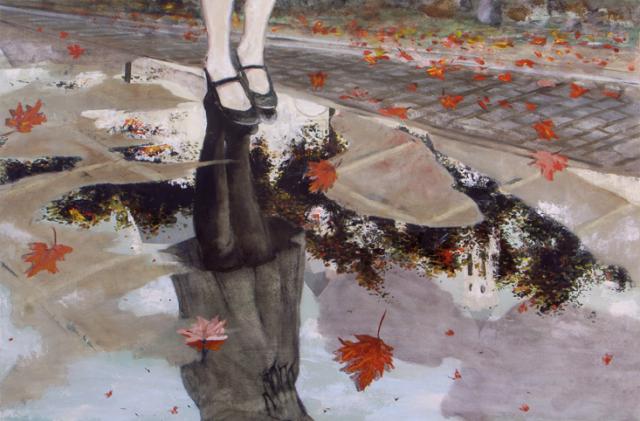
II. picking up with some of your after-thoughts from our first discussion of "Alice":
Herbie: Due to an unfortunate mishap with grammar ... I got to read an interesting version from 1898 ... what interested me most were the advertisements at the end ... each one advertised a different kind of book about nature ... they covered plants in different climates and regions, gardening, bird-watching, fishing, and other larger animals. To me, this meant that the publisher believed that Alice in Wonderland is best placed in a genre about nature, plants, and animals.
mkarol: Instead of buying a hard copy Alice in Wonderland, I found the full text online ... posted onto a separate medium, does that actually change what it is? ... Is my Alice in Wonderland now different from those of the book-readers, just because I read it off of a computer screen?
--spleenfiend: i get too distracted by the rest of the internet...
--aseidman: does listening to it on audio ... turn it into a performance...?
Sven Birkets, "The Time of Reading: On Books in a Technological Age" (A lecture at the New York Public Library, May 1, 1996):
a love of literature and of reading of the sort that could be called "immersive" -- as opposed to "escapist" -- is ... very closely tied to the private .... this ... is threatened with eradication, not just by the myriad electronic circuits we have woven into the fabric of our lives, but also by the collective mind-state that upholds circuited interconnectedness as ultimately desirable .... The self of the future may ... be a decentered entity, liberated from the isolation that once pressed in the warps and wrinkles of eccentric subjectivity, enabled through omnipresent circuitries to distribute itself through systems and networks.
mkarol?? testify to (any difference in) your experience of reading on-line?
others: comparative experience of in-book and on-line reading??
in "absorbed experiential time"; consider, for example the reversal of
order (time? meaning? ) in The Future of Publishing.
TPB1988: If a book were to be strictly one genre without the mixing of other genres then it would not be a very good book. To me genres are similar to the colors of a rainbow .... You can technically separate them but it looks much better when all the colors come together and create a much more beautiful result.
The more I think about this topic the more I appreciate Alice in Wonderland for
its subtle rebellion against fitting in any specific genre.
Molly: To me, it seems obvious that "Alice's Adventures in Wonderland" is a parody of "the quest." Alice does so many things to try to advance herself in the world she has found herself in, but ... where does she end up? In the same place ... when you really think about it, isn't everything humans do silly in the end?
spleenfiend: "Algebra in Wonderland" makes ... the book seems a lot less "dreamlike" .... The book...'s more likely to be a parody of life in general ... by taking ordinary things and making them absurd, perhaps to open our eyes to them? ... perhaps similar to how through interpreting and trying to make sense of their own dreams, people often notice new things about their lives and relationships ... could dreams and parodies be similar in some ways?
[is the subconscious a parody of consciousness??]
because all of us, together, have created a reality, a safe one, that we follow and live in ... it takes a certain amount of strength to dream and live the way alice does. and when, we as readers read her story, it takes a certain amount of strength to give it a chance and believe it rather then to dismiss it as a childs imaginings.
jrf: I really like ... the idea of different understandings of how the world works/should work as different realities .... I'm confused, though, about what you mean [by] ... the "way" that Alice dreams/lives? Is the value of her dream-adventures in the possibility they suggest for expanding our understanding of how the world works to include multiple realities?... do nonsense stories serve to remind us of the impossibility of establishing an objective truth ...[or] merely point out our own imperfections in order to encourage further searching in a different direction?
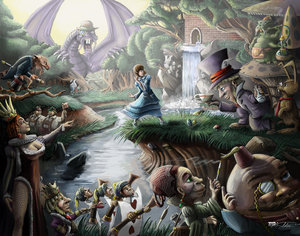 |
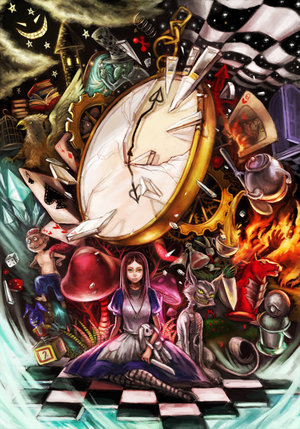 |
II. From last week (and the literary critics Rackin, Kincaid and Auerbach):
--via the portrayal of the comic? grim? horror? of lawless underground--
OF the reality of our constructed universe
this very sensible 7-yr-old, @ stage of development/education where
the world appears completely explainable and unambiguous, is
shown how arbitrary and constructed all systems are--
including the most crucial above-ground convention:
the nearly universal belief in permanent self-identity,
deconstructed as Carroll traces the chaos of this little girl's psyche:
the dream is composed of fragments of her own personality--
she is the croquet game without rules AND its violent arbiter, the Queen of Hearts;
she is accused, accuser, judge, jury, witness AND defendant
FOLLOWING JRF: WHAT ARE WE TO DO WITH THIS?
if a dream-analysis is a method whereby the dreamer can successfully work out/solve a deep
-seated problem whose existence the conscious faculties will not allow themselves even to admit,
what is the result (for Alice, and for us) of our immersion in her dream narrative?
WHAT DOES IT DO TO US AS READERS OF FICTION?
HOW DOES IT GUIDE US TO READ, OR UNSETTLE THE GUIDES WE HAD?
WHAT DOES IT DO TO THE FORM OF NARRATIVE PROSE FICTION ITSELF,
AND TO HOW WE THINK ABOUT THAT GENRE??
(discuss in pairs??)
On that Facebook page about Rethinking World Literature, Wai Chee said,
I'm ... intrigued by the notion of the "cognitive unconscious" ... a great way to think about the work of Walt Whitman, Samuel Beckett, and Gertrude Stein, among others. I would associate the ... the cognitive unconscious -- not with any thematics, but with syntactical structures and rhythmic repetitions. These features seem to have been present in world lit from the very first. In Gilgamesh, in the astonishing race through the tunnel against the journey of the sun, these lines are repeated 12 times, not so much telling a story as punctuating time:
When he had gone one double hour,
Dense was the darkness, no light was there,
It would not let him look behind him.
When he had gone two double hours,
Dense was the darkness, no light was there,
It would not let him look behind him.
When he had gone three double hours...
... one place to detect [this part of the] brain at work might be in those moments (in Thoreau, Kafka, many others) when animals are seen or heard half externally and half internally, a kind of low-common-denominator rendition of the cognitive unconscious.
Here's Thoreau actually hearing the "trump of bullfrogs, the sturdy spirits of ancient wine-bibbers and wassailers, still unrepentant, passing "the cup with the ejaculation tr-r-oonk, tr-r-oonk, tr-r-oonk! and straightway comes over the water from some distant cover the same password repeated... tr-r-oonk! and each in his turn repeats the same down to the least distended, leakiest, and flabbiest paunched." Frog linguistic expression as the cross-species origins of the sounds of poetry?
me: I'm about to teach Alice's Adventures in Wonderland, which is full of puns, where all the animals speak...and where the cognitive unconscious is certainly a-boil! So: are we working our way towards some alternative organization of world literature, that attends less to time- or place-based origins, more to where from in the brain it arises....?
Wai Chee: Yea, it would be interesting to try out an alternative organization of world literature based on brain activity, with a large provision for the unthought, unarticulated -- the cognitive unconscious as the most robust common ground for the human species. Different cultures (and different kinds of literature) would then acquire their special features by how that common ground is differentially articulated into speech .... maybe this could be one way to bring back cultural specificity -- breaking down the cognitive unconscious, localizing it and redistributing it according to its variations in different environments: the different permutations of time in New York vs. a monastery in Tibet, and in children's lit with animals (say) vs. in Kafka's The Metamorphosis?
From this perspective, let's look in particular @ the genre of poetry,
so repeatedly embedded in the narrative
(and which Alice gets so tired of listening to...).
What's its use-value in the story?
How is it employed?
What portion of brain activity might it represent-or-articulate???
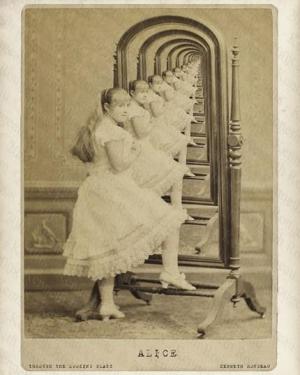 |
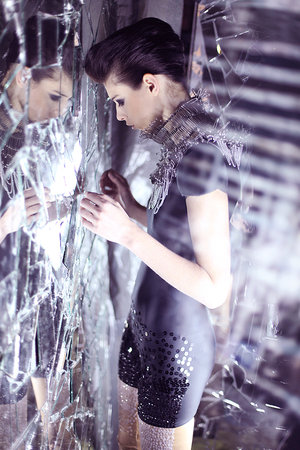 |
Class Notes by sgb90 and by aybala50


